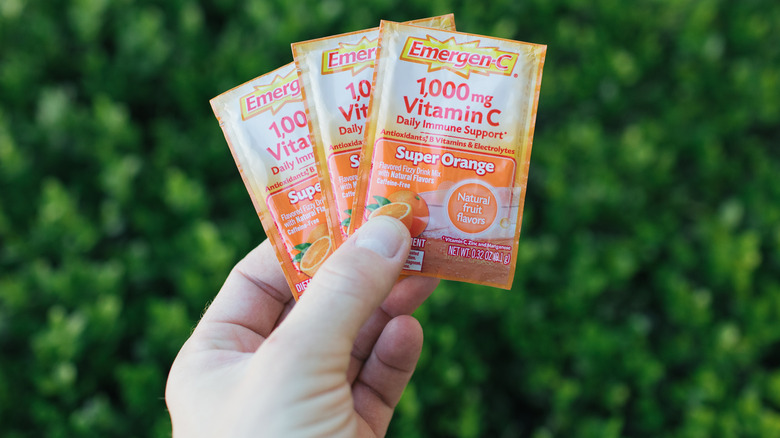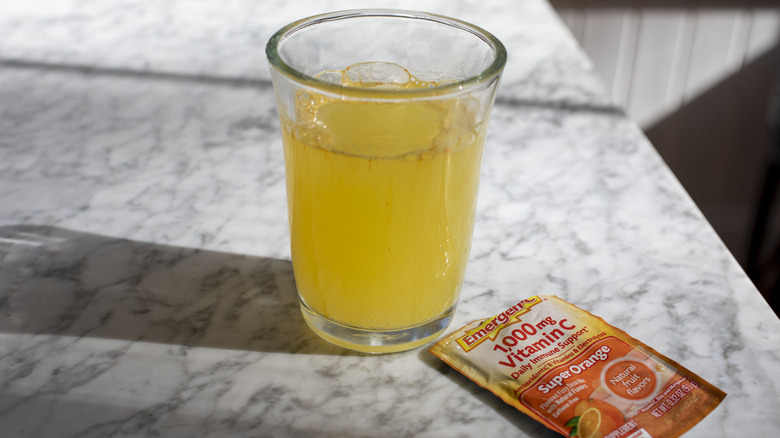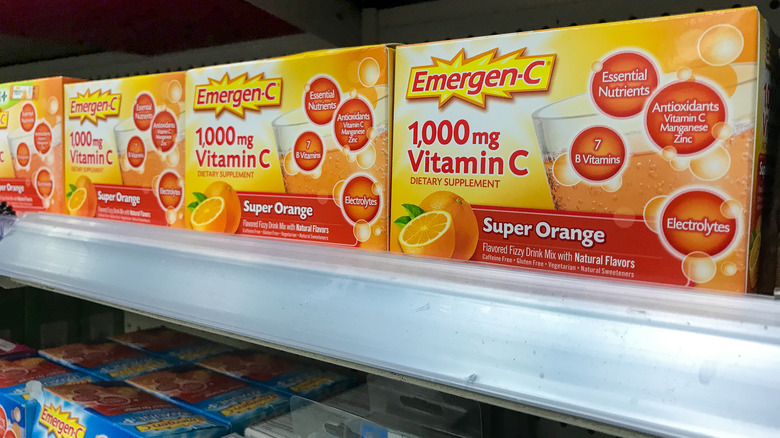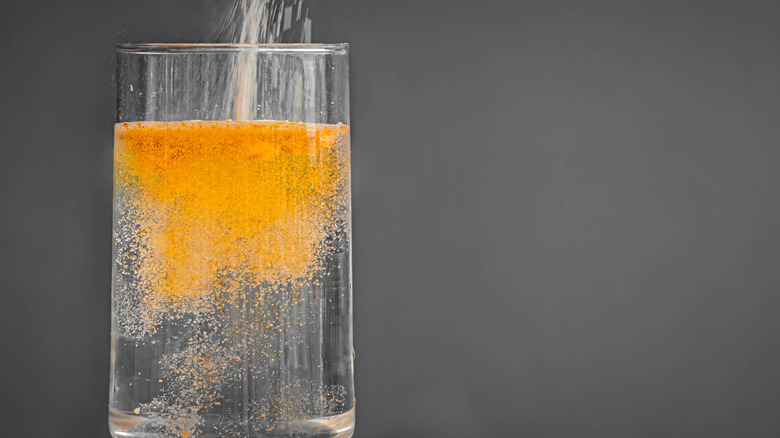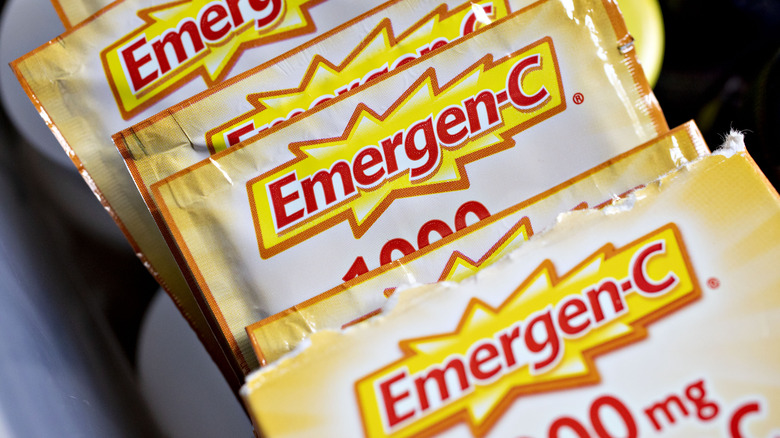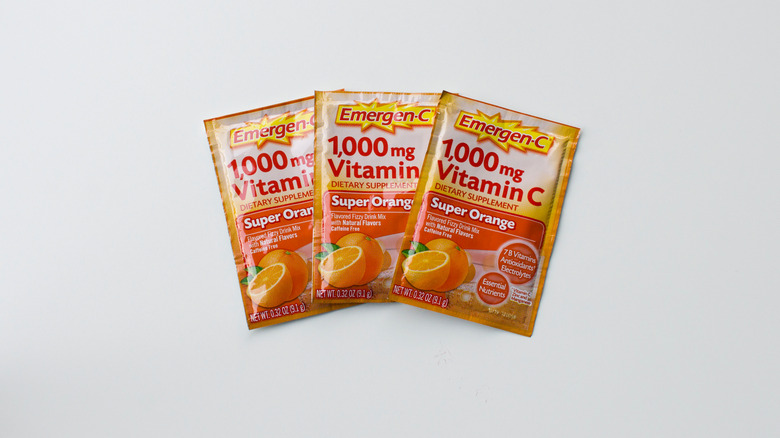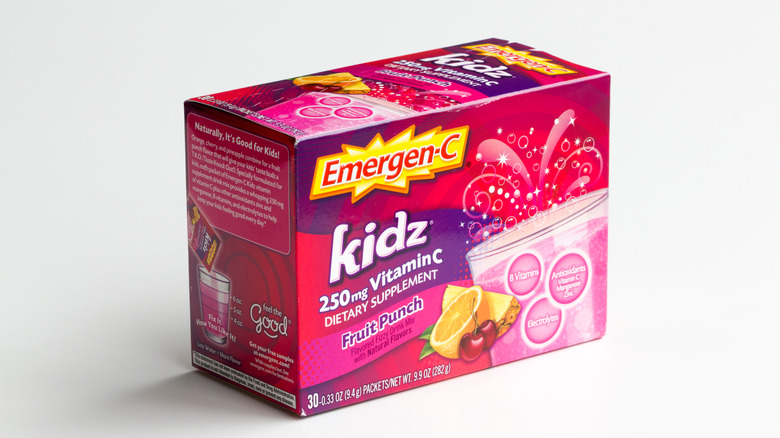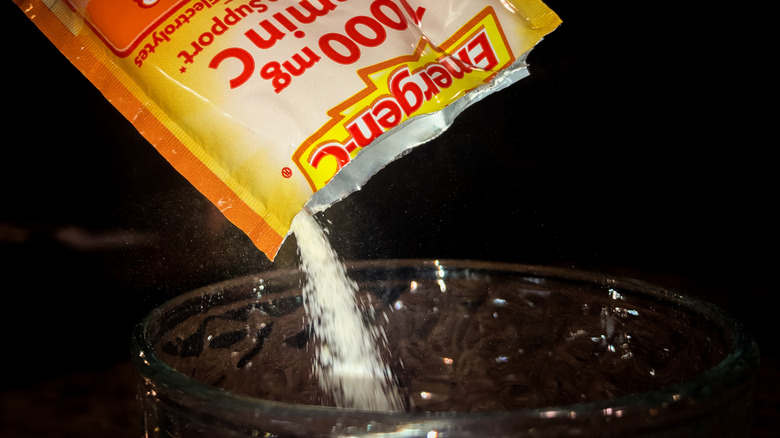Everything You Should Know About Emergen-C
If you're a fan of vitamin supplements, you'll know that Emergen-C is a heavy hitter. It promises a huge boost of vitamin C and various ingredients to "support your wellness goals" and your immune system (via Emergen-C). Sales of Emergen-C products brought the Alacer Corp company a cool $135.6 million in 2019 alone, making it one of the most popular supplements out there, according to Statista.
Since then, it's unlikely that Emergen-C's sales have suffered, because, according to the Financial Times, dietary supplement sales across the board rose 16.7% from 2019 to 2020, with a 51.2% rise in March 2020 (for obvious reasons). Yes, this has surely meant even bigger business for the company.
But is Emergen-C really as supportive for health as it's perceived to be? And where did the fizzy drink come from in the first place? In this article, we're taking a look at everything you should know about Emergen-C.
Emergen-C has been around for a while
Emergen-C has been a staple in the vitamin aisle for a good few decades now. According to the Emergen-C website, it was introduced in 1978 by Alacer Corp, which "introduced a simple vitamin C plus minerals with B vitamins dietary supplement drink mix, which was quickly embraced by people seeking a refreshing way to support a healthy immune system." The website claims that "news of this fizzy sensation spread and Emergen-C vitamin drink mix found an impressive following, more and more people began mixing up the original citrus-y flavor to feel the good every day."
Then in 2012, Alacer Corp was acquired by pharmaceuticals giant Pfizer, who entered into the venture with fellow company GlaxoSmithKline in 2019 (via GSK). The demand for vitamin C among consumers in America is largely due to a man named Linus Pauling, who heavily extolled the virtues of the humble vitamin for health in his book, "Vitamin C and the Common Cold," according to Vox. This was not without controversy, and Pauling — and his claims surrounding vitamin C and its helpfulness around illness — remains contested to this day.
Emergen-C is more than just vitamin C
With its bright orange color and citrus taste, you'd be forgiven for thinking that Emergen-C is simply a vitamin C supplement. Not only does the Emergen-C line feature a range of products and formulations focusing on more specific wellness desires, but their flagship product is a combination of a fair amount of different vitamins and minerals.
According to the official website, Emergen-C's original formula contains 1,000 milligrams of vitamin C, seven B Vitamins, zinc, manganese, and electrolytes. Emergen-C's ingredients page goes into detail about the benefits of these components, naming vitamin C as "essential in maintaining a healthy immune system, and ... critical to the formation of collagen" and zinc as necessary to "maintain white blood cell activity, and [help] support antioxidant protection."
It's worth pointing out, though, that each of these assertions by Emergen-C contains an asterisk, which points to a disclaimer that reads, "These statements have not been evaluated by the Food and Drug Administration. These products are not intended to diagnose, treat, cure or prevent any disease." While the product is full of potentially healthful ingredients, it's worth fully investigating any supplement you're taking and not just, say, simply reading the label.
If you're a lover of long-distance running, Emergen-C could benefit you
Vitamin C has long been a go-to remedy for the treatment and prevention of colds. In reality, though, it's been found that doses of vitamin C may not be as helpful as you thought, particularly when taken after the onset of cold symptoms.
A 2013 review conducted by the Cochrane Acute Respiratory Infections Group, which compared over 29 trials and 11,000 participants, found that "trials of high doses of vitamin C administered therapeutically, starting after the onset of symptoms, showed no consistent effect on the duration or severity of common cold symptoms."
The same review, however, did find that vitamin C is helpful for marathon runners, skiers, and other people practicing sports that puts the body under a large amount of strain. According to the review, "In five trials with 598 participants exposed to short periods of extreme physical stress (including marathon runners and skiers) vitamin C halved the common cold risk." If you're an athlete looking to prevent colds, well, then Emergen-C could be particularly helpful.
Emergen-C has supported charities for decades
Emergen-C has certainly seen financial success as a brand, but it has also long been a supporter of giving money to charitable organizations. Emergen-C has previously donated funds to breast cancer research, awareness, and prevention efforts, and to the Whole Planet Foundation, a nonprofit focused on alleviating global poverty, as well as various other nonprofit organizations throughout their history (via Emergen-C).
The company frequently attaches certain products to fundraising for different causes and organizations, too. Breast cancer awareness, for example, is funded by sales of Emergen-C Pink, their pink lemonade-flavored supplement.
Emergen-C also supports Vitamin Angels, a charity that seeks to provide mothers and children at particular risk of malnutrition with vitamin sources with their products aimed at use for children, Emergen-C Kidz. Plus, the brand has partnered with charity:water and, according to Emergen-C's website, is "raising awareness and helping fund clean and safe drinking water for communities in Ethiopia" with the charity.
Emergen-C has had its fair share of controversy
Emergen-C may seem uncontroversial, but its purported health benefits found it at the mercy of legal action back in 2013. A class-action lawsuit was filed against Alacer Corp, the California-based company that manufactures and sells Emergen-C, for making false claims about the efficacy of the product and was "seeking redress for Alacer's unjust, unfair, and deceptive practices in misrepresenting the health benefits of Emergen-C in violation of California law," according to the Superior Court of California legal documents (via Truth in Advertising).
The document goes on to explain that "Alacer deceptively markets Emergen-C as a supplement that 'supports' or 'boosts' the user's immune system," as well as other claims about Emergen-C's marketing. It also proposed that the health benefits advertised by Alacer Corp for Emergen-C had no scientific evidence to fully support the claims they make. The lawsuit was found in favor of the plaintiffs, with a superior court judge giving final approval to a $6.45 million settlement in June 2014, according to Truth In Advertising.
Is Emergen-C regulated by the FDA?
Emergen-C may be flying off the shelves and into the baskets of customers due to its potential for immune support, but it may surprise you to learn that one big organization — the FDA — hasn't tested its efficacy or safety, nor given it its seal of approval. This, however, is not due to any specific fault on Emergen-C's part itself, but rather its classification within the FDA's guidelines.
As the Emergen-C website pointed out, the product markets itself as a "dietary supplement." And supplements are defined as "a product taken by mouth that contains a "dietary ingredient" intended to supplement the diet," according to the FDA. Due to Emergen-C's supplementary status, the FDA doesn't need to offer their go-ahead for use, with the FDA stating, "Unlike drug products that must be proven safe and effective for their intended use before marketing, there are no provisions in the law for FDA to 'approve' dietary supplements for safety or effectiveness before they reach the consumer."
Emergen-C can be used in a bunch of different recipes
While Emergen-C may be primarily known as fizzy drink, the company is keen to stress how versatile the product can be. According to the Emergen-C website, there are a bevy of beverages — and snacks — that can be made using Emergen-C. After all, it is marketed as a "dietary supplement."
In need of warming up? You can try Chai A L'Orange, which is made with chai tea, one packet of Emergen-C Super Orange mix, honey, and nutmeg. If you're looking for something more solid, check out the Eye-Popping Ice Pops, made simply with water and Emergen-C mix that's then frozen into popsicle shapes.
When it comes to mixing the product with alcohol, however, Emergen-C says it's a no-go. In response to a March 12, 2020 tweet from a user showing a "quarantini" apparently made of gin and Emergen-C mix, Emergen-C wrote, "We do not recommend taking any of our products with alcohol." Maybe stick to the teas and smoothies for the time being!
Can the vitamin C in Emergen-C prevent colds?
Using vitamin C to help combat the common cold or flu is a tale as old as time — but how effective is it really? Dr. Amesh Adalja, an infectious disease physician and a senior scholar at the Johns Hopkins Center for Health Security, told Women's Health, "Emergen-C is a vitamin C supplement, and there's no evidence that it benefits people with the cold or influenza or [that it] affects your propensity to get the cold or the flu."
Adalja's assessment is shown in a study that looked at the effect of vitamin C supplements on preventing colds. Published in Cochrane Database Systematic Review, the study found a "failure of vitamin C supplementation to reduce the incidence of colds in the normal population." As such, the study revealed that the use of "routine mega-dose prophylaxis is not rationally justified for community use."
Adalja told Women's Health he fears that people may put too much stock in vitamin C supplements and avoid getting a flu shot, an actual proven preventive measure to avoid catching the flu.
This Emergen-C product may just help you sleep
Although Emergen-C's original focus as a product was to "support a healthy immune system," they've since well and truly branched out (via Emergen-C). According to the brand's product page, you can purchase things like Emergen-C Hydration+, a range of drink mixes that contain electrolytes and "as much potassium as a banana" to replenish your body after exercise, Emergen-C Energy+, a supplement that provides caffeine from green tea to help you stay alert, and the puntastic Emergen-Zzzz, a product which promotes sleep through the inclusion of melatonin.
Emergen-C's purported benefits to immune support may be in question, but some of these other products could help in other ways. Melatonin taken as a supplement, for example, has been shown to help those who have insomnia fall asleep quicker and help those with delayed sleep phase syndrome (via Johns Hopkins Medicine).
It's important not to take it too often, however. Johns Hopkins sleep expert Luis F. Buenaver suggests taking melatonin on a "short-term basis" (one to two months) and when taking it, he said "less is more" (1 to 3 milligrams). According to Emergen-C, a packet of Emergen-Zzzz Berry PM contains 3 milligrams of melatonin.
Emergen-C contains more vitamin C than your body can use
Emergen-C delivers a super dose of vitamin C, which may be far more than you need. For example, the Super Orange Original Formula Immune Support product offers a whopping 1,000 milligrams of vitamin C per serving. When it comes to this vitamin, though, less may truly be more. The Mayo Clinic explained that the recommended daily amount for vitamin C for adults is much smaller than what Emergen-C provides, coming in at just 65 to 90 milligrams per day.
The Mayo Clinic also pointed out that vitamin C is available in adequate amounts for most people simply through a healthy, balanced diet. And once you look at the number of vitamin C-containing foods, it's easy to see how that's the case. Many common foods like potatoes, broccoli, and (of course) oranges deliver a large amount of what you need daily, per Medical News Today. One large orange, for example, will give you 97.5 milligrams of vitamin C, or 108.8% of your recommended daily intake.
Taking in an excess of vitamin C may sound like a wise thing to do, but, according to the publication, your body is unable to store the vitamin. This means "any excess leaves the body in urine."
Emergen-C contains zinc, but it may not shorten your cold
Much is made of Emergen-C's vitamin C content, but there's another ingredient in the drink mix which also carries a reputation for immune support: zinc. Although one of zinc's essential functions is to help protect the immune system, it may not be as helpful when it comes to the common cold.
Dr. Tina Ardon, a family medicine doctor at Mayo Clinic in Jacksonville, Florida, told Women's Health, "Study results are mixed, but the short answer is that zinc probably doesn't prevent or treat a cold."
The Mayo Clinic takes a similar view. The institution did point to several studies that have shown that zinc supplements could help, including one which showed that zinc may reduce the length of a cold by up to 24 hours, especially if taken within a day of cold symptoms appearing. However, they concluded that, fundamentally, the results of studies on zinc for cold treatment or prevention have generally been drawn from groups that are too small to get a conclusive answer. And so it remains unclear whether zinc helps that much.
Don't give adult Emergen-C to children
It's only natural that kids would be drawn to the bright color and sweet taste of Emergen-C. Luckily for them, Alacer Corp has them covered. Emergen-C offers a version aimed at younger people, Emergen-C Kidz, which is aimed at 4- to 13-year-olds and delivers 250 milligrams of vitamin C per serving, as well as high amounts of B vitamins too.
While your kids may love the taste of Emergen-C, it would be wise to avoid giving them the adult version. Regular Emergen-C, which contains a 1,000-milligram dose of vitamin C, shouldn't be given to children under 15, according to the Pediatric Urgent Care of Northern Colorado. The facility explained that the high dosage of vitamin C "can cause upset stomach in children." They continued, writing, "Instead of giving your child Emergen-C or a similar supplement, seek to provide enough vitamin C through a balanced diet."
Too much Emergen-C could lead to kidney stones
It might seem like a fairly innocuous drink mix, but having too much Emergen-C could be harmful. According to the National Institutes of Health, the tolerable upper intake level for vitamin C in adults aged 19 and older is 2,000 milligrams a day, with a serving of Emergen-C coming in at 1,000 milligrams.
Going above 2,000 milligrams daily, as Dr. William Curry, professor of internal medicine at the University of Alabama at Birmingham told Health, may cause unwanted side effects. As he explained, "You run the risk of getting kidney stones, and you're probably beyond the point where there's going to be any benefit anyway." As such, Curry recommends that people taking Emergen-C at least limit their dosage.
Curry's comments about kidney stones are supported by a 2013 study published in JAMA Internal Medicine, which found that men taking vitamin C supplements over 11 years were twice as likely to develop kidney stones than those who weren't. Other symptoms of taking over 2,000 milligrams daily of vitamin C can include cramps, diarrhea, abdominal pain, and nausea, according to Healthline.
What happens if you take expired Emergen-C?
A lot of us are familiar with the act of digging out an old bottle of vitamins and taking them anyway. What's the harm, right? Well, their efficacy and vitamin content can deteriorate over time. This means, according to Dr. Frederick Hecht, professor of medicine at the University of California, that if you're taking them past their expiration date, "you will not get the full amount of vitamin labeled on the package" (via Women's Health).
However, you shouldn't be too worried about the safety of taking expired Emergen-C. Expiration dates on vitamins and supplements are generally based on the potency of the ingredients, not the safety of the product itself, as Verywell Fit pointed out. So, as long as your Emergen-C hasn't gone moldy or is giving off a strange smell, it should still be safe to take. You just won't get the full vitamin content that you would have had you taken them earlier. An exception to this rule is prenatal vitamins, which should be taken within the expiration date to make sure you're getting the correct amount of folic acid.

